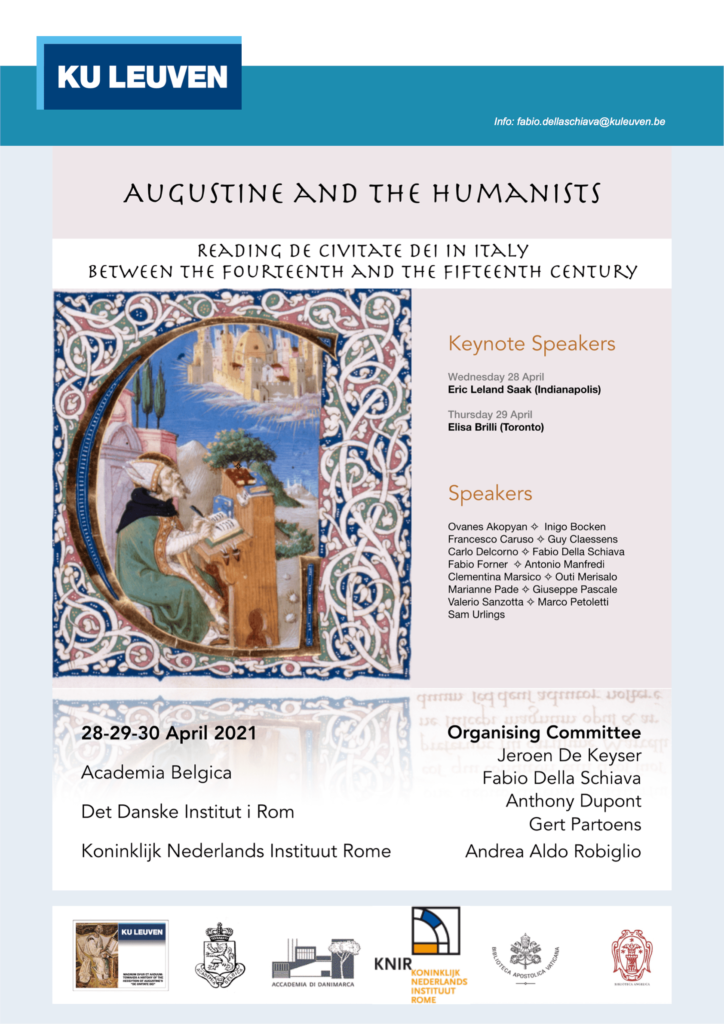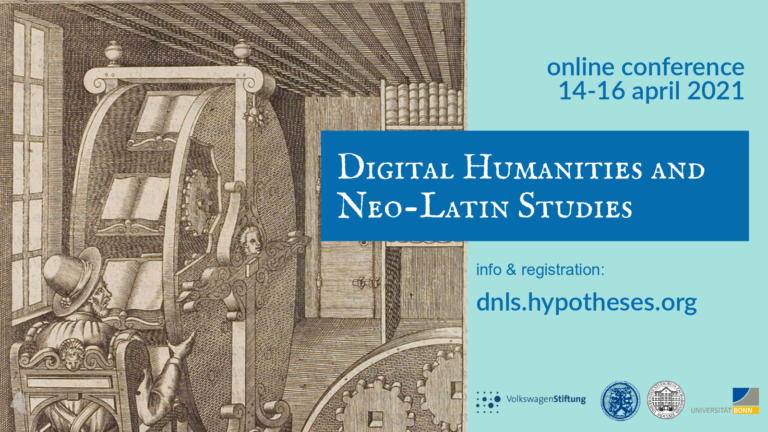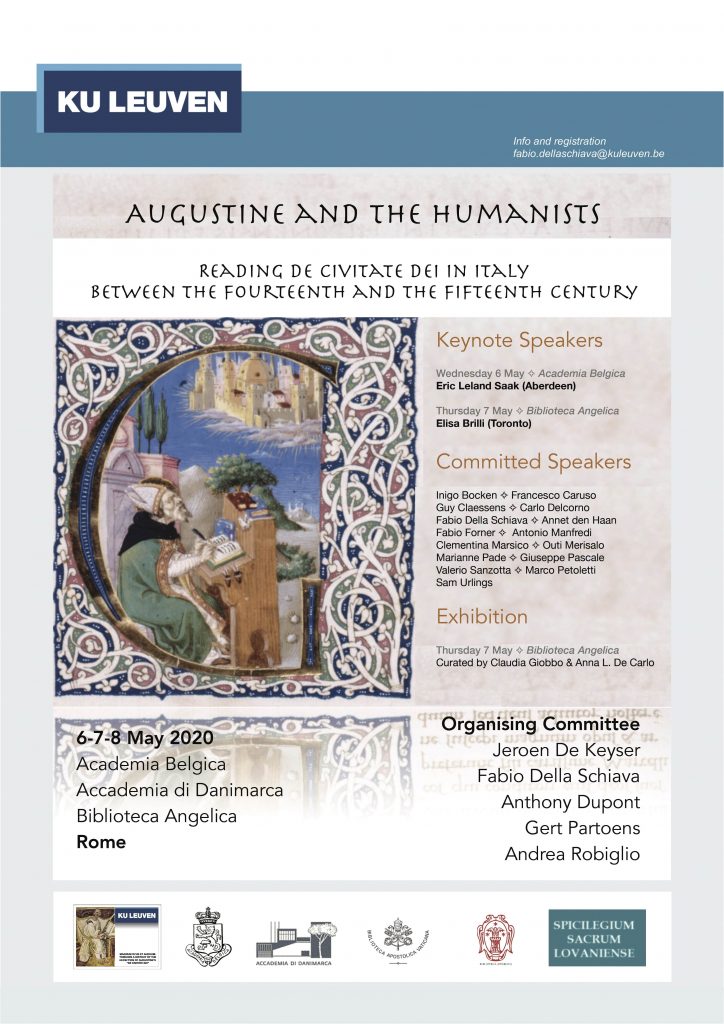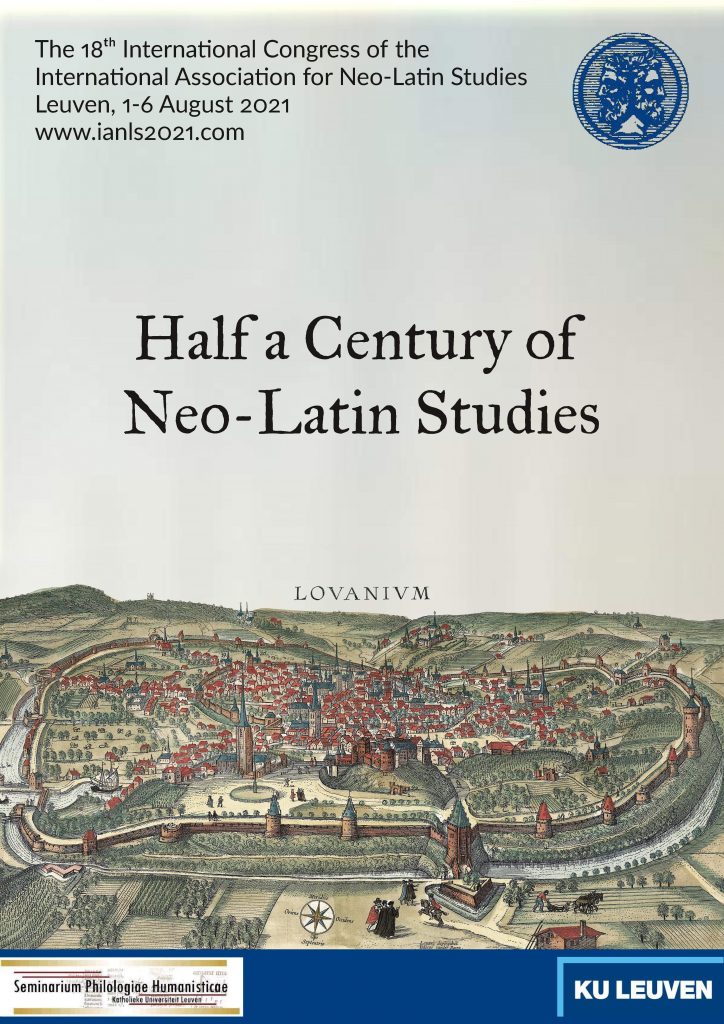Op 17 en 18 november 2022 organiseert het ERC SKILLNET-project onder leiding van Dirk van Miert een internationaal congres in Utrecht: ‘Digital approaches to the Republic of Letters: network research, text mining, and infrastructures‘. U wordt van harte uitgenodigd een proposal in te dienen. De Call for Papers vindt u hier. De deadline is 6 september.
Op 10 en 11 juni vinden in Ede de OIKOS-dagen plaats. Op zaterdagmorgen zijn er twee presentaties over Neolatijn:
- Nicolò Bettegazzi (RUG): ‘From the Fascist war to Italy’s Catholic rebirth. Second
World War and the end of Fascism in the Latin poetry of the Jesuit Vittorio Genovesi
(1887-1967)’ - Ruben Poelstra (UL): ‘The Return of the Virgin: the Duality of Sannazaro’s Golden
Age in the De Partu Virginis’
Het volledige programma vindt u hier. Graag opgeven voor 1 mei.
The Laboratory for Source Editing & Digital Humanities at the Faculty of ‘Artes Liberales’ of the University of Warsaw organises the online conference ‘Respublica Litteraria in Action: Travels – Maps – Itineraries’. The conference will be held online on Zoom on March 18-19, 2022. The conference programme (including a link to Zoom meeting) is available at http://fontes.ibi.uw.edu.pl/?page=announcements&lang=eng. You can download it in PDF here. For further questions please contact Anna Skolimowska: as@al.uw.edu.pl.
CALL FOR PAPERS
Transnational Drama within and beyond Europe, 1450-1750
AMSTERDAM AND ONLINE (HYBRID) – 1 AND 2 SEPTEMBER 2022
Keynotes by Frank Fischer (Freie Universität Berlin), Barbara Fuchs (University of California), Ioana Galleron (Université Paris 3), Nigel Smith (Princeton University)
Early modern drama research is done on an increasingly large scale. On the one hand, this is the result of the use of computational research methods and the expansion of online resources for the study of drama. On the other hand, the larger scale is the result of scholars making connections between fields that were previously separated. These new approaches increasingly take into account colonial drama and drama written by Jesuit missions, as well as the transnational movements of theatre texts and practices across national, linguistic, and confessional borders. Mobility and circulation can be studied on a small scale, but the accumulative effect of these studies is a view of early modern drama that extends over a large portion of the world map and that begins to create a global picture. What new skills do scholars apply in order to tackle these changing scales of research?
We would like to invite participants to discuss the integration of methods and the synthesis of research results on larger scales in the study of early modern drama. The focus will be methodological, but we encourage participants to approach methodological aspects by way of case studies. Possible focuses include:
- the integration of computational and non-computational methods;
- the connections between different national traditions and languages, including Latin: circulation, mobility, transnationality;
- the connections between the local and the supralocal;
- the integration of large-scale and small-scale research methods;
- the integration of various databases, resources, and data formats;
- the relationship between the different research fields for early modern drama: literature, performance, cultural history, etc.
The conference will take place in hybrid format, on location in Amsterdam with the possibility of following, contributing, and interacting with the other participants online.
We would like to receive your proposal by March 1st 2022. Please send your proposals for a twenty-minute presentation to dinah.wouters@huygens.knaw.nl. The abstract, as a word file, should be no more than 300 words in length. Please also send a brief curriculum vitae in a separate file. Notification of acceptance will be given by April 1st.
Organising committee: Dinah Wouters, postdoctoral researcher (dinah.wouters@huygens.knaw.nl), Jan Bloemendal, senior researcher and PI TransLatin (jan.bloemendal@huygens.knaw.nl)
About the Project: This conference is organised within the scope of the TransLatin project (translatin.nl) of the Huygens Institute for the History of the Netherlands, which forms part of the Royal Netherlands Academy of Arts and Sciences. The project studies the international network of Netherlandish Neo-Latin playwrights and the vital interaction between Latin theatre and a ‘transnational’ web of plays, through computational analysis and a qualitative investigation of sources.
NVNTIVS DE PROXIMO CONVENTV ACADEMIAE LATINITATI FOVENDAE (11-15.VI.2022)
“DE VRBE ROMA”
SIVE
DE CONVENTV OMNIVM GENTIVM QVEM ROMAE CELEBRABIT ACADEMIA LATINITATI FOVENDAE (11-15. VI. 2022)
Pandemia coronaria, quae diu ac vehementer saeviit, factum est ut Conventum omnium gentium, quem medio hocce anno 2021 celebraturi eramus, differre cogeremur. Etiamsi nondum sit morbus ille vel insitionibus vel aliis remediis plane depulsus, tamen spes est fore ut eius vires paulatim laxentur. Hinc in annum proximum non sine confidentia prospicimus et Conventum nostrum denuo proponere audemus; veri enim est simile fore ut verno tempore ad finem vergente fortuna nobis faveat hominumque coetus permittat maiores.
Itaque quadriduum praestituimus quod nobis ad congressum esse videbatur aptum: peragetur Conventus a die 11 usque ad 15 mensis Iunii anni 2022. Die 11 habebitur Coetus Generalis Academiae Latinitati Fovendae; reliqui autem dies ipsi Conventui dicabuntur. Ad colloquia Latina tam iucunda quam docta per eos dies serenda in monasterium S. Caeciliae Romanum, quod est in regione Transtiberina, conveniemus; at, acroases nonnullas et orationes ut audiamus, devertemus etiam in Pontificiam Studiorum Universitatem Salesianam, quae est in Urbe, atque in Academiam, cui nomen Vivarium Novum, quae est Tusculi.
Conventus argumentum erit ‘De urbe Roma’, quod etsi simplex est et unum, latius tamen patet. Alios enim de litteris antiquis, mediaevalibus, vel recentioribus et recentissimis, alios de descriptionibus Urbis eiusque topographia, alios de aedibus et villis poetice descriptis, alios de titulis, alios de historia Urbis, alios de pictura Romana, alios de notione Urbis Romae eiusque fortuna disserere iuvabit. Ut rerum, ita temporum quae respicientur dubio procul erit varietas insignis, quod hi ab Urbe condita, ut ita dicamus, incipere cupient, illi ad hoc, quo vivimus, aevum descendere volent; quidni liceat utrumvis? Admittentur ergo, quantum id quadriduum sinet, orationes Latinae maxime variae, ea tamen condicione ut argumenta tractanda cum lingua Latina dilucide coniungantur et fontibus Latinis quodammodo innitantur.
Inter Conventum orationes acroasesque Latinae locum obtinebunt summum illae quidem, at etiam spectacula quaedam edentur producenturve acroamata, haud neglectis cantibus Latinis.
Exitum optatum eiusmodi Conventus non habebit, nisi oratores boni oratricesque bonae interesse ipsi voluerint, qui argumenta proposita apte, docte, Latine exponant. Omnium insuper participum erit acroases singulas suis interrogationibus, observationibus, disputationibus locupletare.
De ipsis autem orationibus habendis generatim praemonenda sunt haec:
- Singulis oratoribus dabitur semihora ad dicendum.
- Quo facilius participes verba prolata intellegere possint, auctores sumus ut orationum exempla duabus circiter ante Conventus initium hebdomadibus ad moderatores mittantur per cursum electronicum; namque verba, dum recitantur, tam excipi auribus quam ope programmatis alicuius electronici oculis inspici posse velimus. Quodsi hic illic invenietur, qui ex tempore orationem Latinam habere velit, nihil obstabit, dummodo, programmate quod Anglice ‘Powerpoint’ appellatur usus, rerum adumbrationes sive lineamenta quaedam proponat, quae audientibus auxilio sint futura.
- Acta Conventus typis postea edentur.
Ad hos igitur dies Latinitatis festos te libenter invitamus, cum ut rebus agendis intersis, tum ut orationem praesens habere conventusque argumentum, quod diximus, disceptatione tua illustrare atque ornare digneris. Gratissimum nobis feceris si data epistula annueris, addito orationis habendae titulo necnon summario, quod verba summum CCL complectatur. Quem tu titulum subiuncto summario ut ad Kalendas Ianuarias anni 2022 ad nos cures mittendum oramus, hac sola adhibita inscriptione, quae est : nicodemico4@gmail.com
Deinde mense, uti speramus, Ianuario anni 2022, cum proposita omnia nobis erunt allata, ordinem rerum in Conventu agendarum rite constituemus deque eo te quam primum fieri poterit certiorem faciemus.
Hoc est igitur nobis in votis, ut incepto faveas, epistulae huic rescribas nomenque des in Conventum! Fac optime valeas!
D. anno 2021 a.d. V Id. Dec.
Francisca Deraedt – Nicolaus De Mico – Christianus Laes – Aloisius Miraglia -Theodericus Sacré
Op 28-30 april 2021 vindt in Leuven het congres ‘Augustine and the Humanists. Reading De civitate Dei in Italy between the fourteenth and the fifteenth century’ plaats. U kunt het programma hier downloaden. Neem voor meer informatie contact op met Fabio Della Schiava (fabio.dellaschiava@kuleuven.be).

Online conference, 14-16 April 2021
An online conference on the current developments and perspectives of Digital Neo-Latin studies, organized by Neven Jovanović (Zagreb), Marc Laureys (Bonn) and Alexander Winkler (Berlin/Halle) under the auspices of the International Association for Neo-Latin Studies.
The conference will be held via zoom. You can register via mail to alexander_winkler@posteo.de.
Please note: The conference is the first part of a two-tiered vacation school, generously supported by the VokswagenStiftung. The second part will be a 3-day in-person workshop in Bonn that is currently being scheduled. More information and a call for participation will follow soon.
Wednesday, 14 Αpril 2021
10.00-10.15: Introduction
OCR, digital editions, and corpora
10.15-11.00 – Enikő Békés: Bibliotheca corvina digitalis – The Renaissance library of King Matthias online
11.00-11.45 – Uwe Springmann: OCR for Neo-Latin
11.45-12.30 – Martin Korenjak/Stefan Zathammer: Nova Scientia. A Semantic Media Wiki and a New Transkribus Model for Studying Latin Science
14.30-15.15 – Marco Petolicchio: Basinio, Hesperis: An overview of its digital architecture
15.15-16.00 – Neven Jovanović:
Preparing a digital critical edition of a Neo-Latin text – Nicholas of Modruš, Oratio de funere Petri cardinalis S. Sixti (1474)
16.00-16.45 – Steven Coesemans/Jan Papy: Magister Dixit
Thursday, 15 Αpril 2021
Text mining and stylometry
10.15-11.00 – Maciej Eder: Textual similarities and Latin literature: a few case studies
11.00-11.45 – Johann Ramminger: Stylometry and Neo-Latin texts: Some case studies
11.45-12.30 – Christof Schöch: Comparison of Text Groups using Measures of Distinctiveness
14.30-15.15 – Patrick J. Burns: Conversational Agents from the Neo-Latin Colloquia to ChatterBot
15.15-16.00 – Maria Chiara Parisi/Yvette Oortwijn: Distributional Semantics for Neo-Latin
16.00-16.45 – Marco Passarotti: The LiLa Knowledge Base of Interlinked Linguistic Resources for Latin
Friday, 16 Αpril 2021
Linked Texts and Data
10.15-11.00 – William Short: The Latin WordNet and meaning representation in electronic corpora
11.00-11.45 – Matteo Romanello: Citation detection with the CitedLoci pipeline
11.45-12.30 – Andreas Walker: CERL resources in the context of Neo-Latin
14.30-15.15 – Marc Laureys/Alexander Winkler: Antonius Sanderus‘ Views on the Political and Cultural Contours of Flandria
DH and the teaching of and the teaching of Neo-Latin
15.15-16.00 – Isabella Walser-Bürgler: Joined Forces. Digital Humanities and Digital Teaching
Conclusions
16.00-16.45 – Ingrid De Smet: Potentials and Challenges of Digital Neo-Latin Studies
Also see: https://dnls.hypotheses.org/.

Van 6 tot 8 mei 2020 organiseren de Academia Belgica, de Accademia di Danimarca en de Biblioteca Angelica in Rome het congres ‘Augustine and the Humanists. Reading De Civitate Dei in Italy between the Fourteenth and the Fifteenth Century’. Het programma en meer informatie over hoe u zich kunt aanmelden vindt u hier.

Het Eighteenth International Congress van de International Association for Neo-Latin Studies (www.ianls2021.com) wordt georganiseerd door de IANLS en de KU Leuven. Het congres zal plaatsvinden van 1 tot 6 augustus 2021 in Leuven. U kunt de First Circulair Letter hier downloaden.

